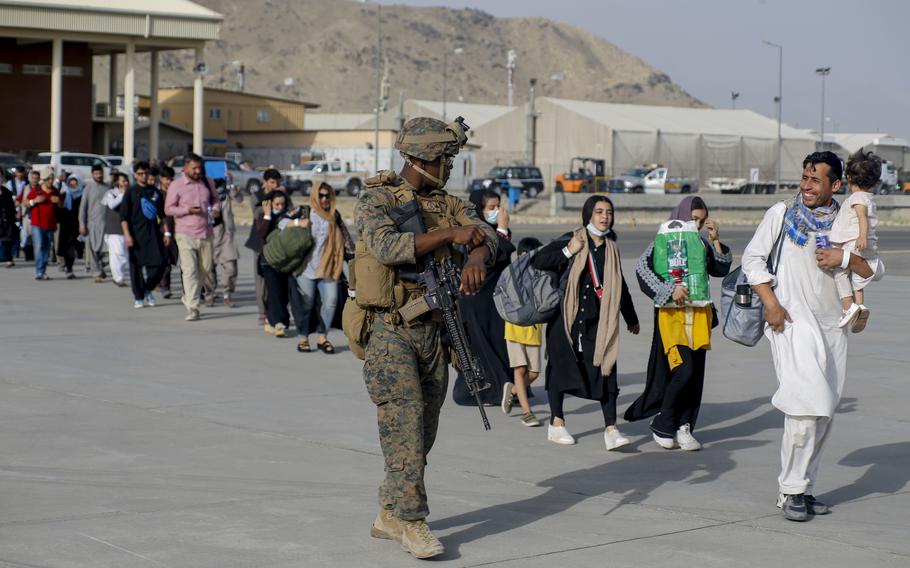
A U.S. Marine assigned to 24th Marine Expeditionary Unit escorts evacuees during an evacuation at Hamid Karzai International Airport, Afghanistan, Aug. 18, 2021. (Nicholas Guevara/U.S. Marine Corps)
Joe Biden was probably always going to be a one-term president. His age was a political liability when he defeated Donald Trump in 2020. And given how time works, it will be more so in 2024.
But his age may be irrelevant in light of the chaos in Kabul. Few politicians can overcome a failed assertion as emphatic and assured as Biden’s on July 8: “The likelihood there’s going to be the Taliban overrunning everything and owning the whole country is highly unlikely.”
Or this: “There’s going to be no circumstance where you see people being lifted off the roof of an embassy in the — of the United States from Afghanistan. It is not at all comparable.”
But, of course, it is comparable, and in ways that have to do with much more than mere optics. Biden was wrong. Everyone would be better served if he could simply say, “Well, we made a mistake.”
This is never easy to do. Biden is a victim of the foible that afflicts politicians, military officers, CEOs and many others with public responsibilities: the perceived necessity to always shine the brightest light on every dilemma.
This is what kept us in Vietnam for so long, the aspirational lie that the enemy was back on his heels and that victory was imminent if we committed just a bit more time, money and troops. This same unwillingness to face the truth played a big part in keeping us in Afghanistan for two decades.
We deceive ourselves with this sort of wishful thinking in other areas, as well. There really is no good news on climate change, but bearers of dark reports about global prospects often attempt to soften the blow by holding out the prospect that somehow technology is going to rescue us, thereby undermining our will to do much of anything, while things quickly fall apart.
We’ve done this with the pandemic. A hilarious caricature of this sort of wishfulness is former President Donald Trump’s musing about the coronavirus on Feb. 27, 2020: “It’s going to disappear. One day — it’s like a miracle — it will disappear.”
In short, politicians have an irresistible instinct to tell us what we want to hear. Cynics might call this lying, but the politicians themselves are not immune to self-delusion. It’s entirely possible that Trump more or less believes some of his outrageous statements, just as it’s possible that Biden just could not believe that Afghanistan could fall so quickly.
But like Vietnam, the war in Afghanistan was always unwinnable. Trump concluded the surrender to the Taliban in February 2020. The Afghan government was excluded from the negotiations. It was a separate peace that disheartened the Afghan military and gave the green light to the insurgents to begin the attacks, negotiations, threats, bribes and intimidation that paved the way for their breathtakingly rapid seizure of the country.
Biden deserves credit for making the decision to leave Afghanistan after two decades of futility. But the hasty exit from Kabul was bungled. A bad war is always likely to end badly, but it was the Biden administration’s job to plan for and to minimize the chaos.
It’s an illusion to think that Trump could have managed a more orderly retreat, but the Biden administration has little excuse for being caught flat-footed. And if Joe Biden would like to be a truly transformational president he could begin by admitting that what we’re witnessing in Kabul is a failure of planning, bureaucracy, intelligence and imagination.
Biden should admit that his administration failed to understand how quickly the Taliban would advance and how rapidly the window for evacuation of Americans and vulnerable Afghans would close. He shouldn’t bother with excuses or attempt to blame anyone else. He should admit that his administration miscalculated and move forward from there.
This sort of candor would be refreshing and maybe even liberating. In fact, if we refused to tolerate anything less, we might exercise more caution before we drift into another hopeless adventure like Vietnam or Afghanistan.
Now, that would be transformational, indeed.
John M. Crisp, an op-ed columnist for Tribune News Service, lives in Georgetown, Texas.